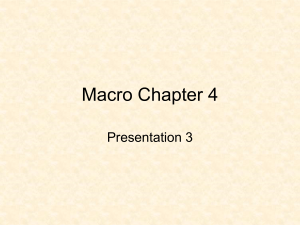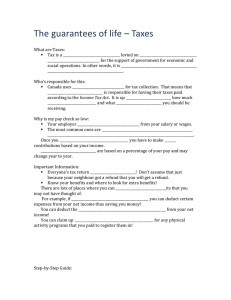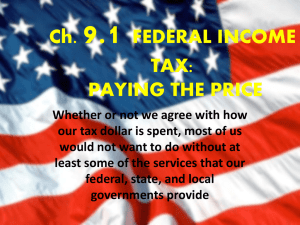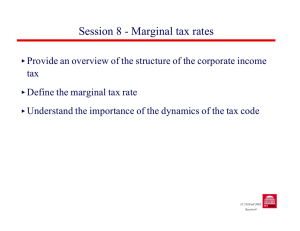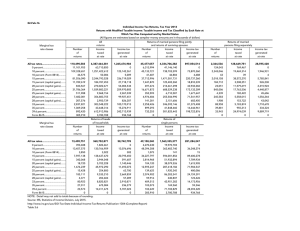Farm Income Tax Management Chapter 16---Key Questions
advertisement
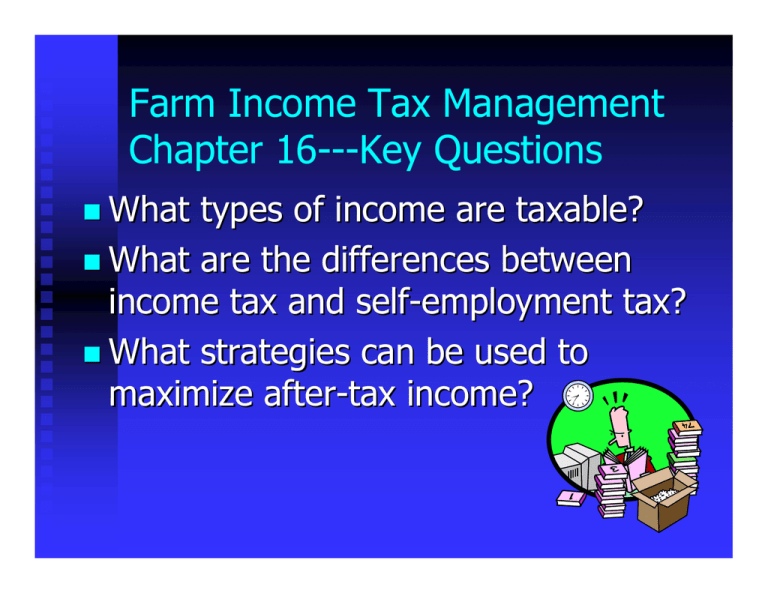
Farm Income Tax Management Chapter 16---Key Questions What types of income are taxable? What are the differences between income tax and self-employment tax? What strategies can be used to maximize after-tax income? Types of Taxable Farm Income Ordinary farm income (Schedule F) Federal income tax State income tax Self-employment tax Capital gains income Capital gains tax (lower rates) IRS Schedule F Gross Farm Income - Farm Expenses (incl. depreciation) = Net Farm Profit Can use cash or accrual. Most use cash. Self-employment Tax Up to $106,800 taxed at 12.4% for Social Security All of it is taxed at another 2.9% for Medicare Ordinary Income Deductions Standard deduction $5,700 for single person $11,400 for married couple Can itemize deductions instead Personal exemption of $3,650 / dependent Family of one has $9,350 tax free income Family of 4 has $26,000 tax free income Remainder is Taxable Income Income Tax Rates Federal (married, joint) Taxable Income Marginal Rate 10% $0 to 16,700 15% $16,700 - $67,900 25% $67,900 – 137,050 28% $137,050 - $208,850 33% $208,850 - $372,950 35% Over $72,950 Iowa Income Tax Rates Increases gradually from .36 % up to 10% at $63,316. Marginal Tax Rate Total tax paid on the last $ of income Example: taxable income = $80,000 Federal rate = 25% Iowa rate = 10% Self-employment = 15.3% Total marginal rate =48.3% Example: Federal Income Tax Net income = $89,350 Taxable income = 89,350 – 9,350 = $80,000 = $1,670 1st $16,700 taxed @ 10% 2nd $67,900 – 16,700 = $51,200 @ 15% = $7,680 3rd $80,000 -$67,900 = $12,100 @ 25% = $3,025 $12,375 Total income tax owed = Tax Credits Credits are subtracted from the amount of tax owed. $1,000 credit for each child under 18 Educational expenses Energy saving investments Foreign taxes paid Capital Gains Income When capital assets are sold for more than original tax basis Taxed at 5% or 15% Not subject to self-employment taxes Breeding livestock raised animals have zero basis, so all sales are capital gains Federal Income Tax Return Farm income + wages, etc. - deductions and exemptions = taxable income x tax rates = ordinary income tax + self employment tax + capital gains tax - tax credits - withholding = total taxes owed Tax Management Strategies 1. Level out income from year to year, avoid high marginal tax brackets Example: Taxable Income year 1: $ 90,000 year 2: $ 10,000 Level income: year 1 $ 50,000 year 2 $ 50,000 Saving Fed Income Tax $16,000 $ 1,000 $17,000 $ 6,800 $ 6,800 $13,600 $ 3,400 2. Defer income into future tax years, earn interest on tax $ $40,000 x 25% tax rate = $10,000 10,000 x 8% interest rate = $800 Use cash accounting to: Delay income Move up expenses Use fast depreciation rates Tax Management Strategies 3. Report enough income to use up personal deductions and credits 4. Qualify income as capital gains when possible 5.Use net operating losses (NOL) to offset past taxes 6. Use income averaging (back 3 yrs) Goal of Tax Management Maximize long-run income after taxes, not minimize taxes. 40% $ $3 0 ,8 8 $5 0 ,1 22 $6 ,3 6 $8 4 ,8 $1 48 5, 0 $1 58 5, 9 $2 00 2, 5 $2 10 8, 72 $3 0 0, 2 $4 00 1, 14 $5 0 9, 7 $7 70 4, 00 $8 0 7, $1 900 33 ,1 50 Marginal Tax Rates (last $) Marginal Tax Rate 50% 45% Federal Self-empl. Iowa 35% 30% 25% 20% 15% 10% 5% 0% Gross Income Total Tax Rate Total Tax Rate Federal, Iowa, SE 35% 29% 30% 30% 26% 25% 20% 32% 32% 33% 21% 15% 15% 15% 23% 23% 17% 17% 15% 10% 5% $3 ,8 80 $5 ,1 2 $6 2 ,3 64 $8 ,8 $1 48 5, 05 $1 8 5, 9 $2 00 2, 51 $2 0 8, 7 $3 20 0, 20 $4 0 1, 14 $5 0 9, 7 $7 70 4, 00 $8 0 7, $1 900 33 ,1 50 0% Gross Income
